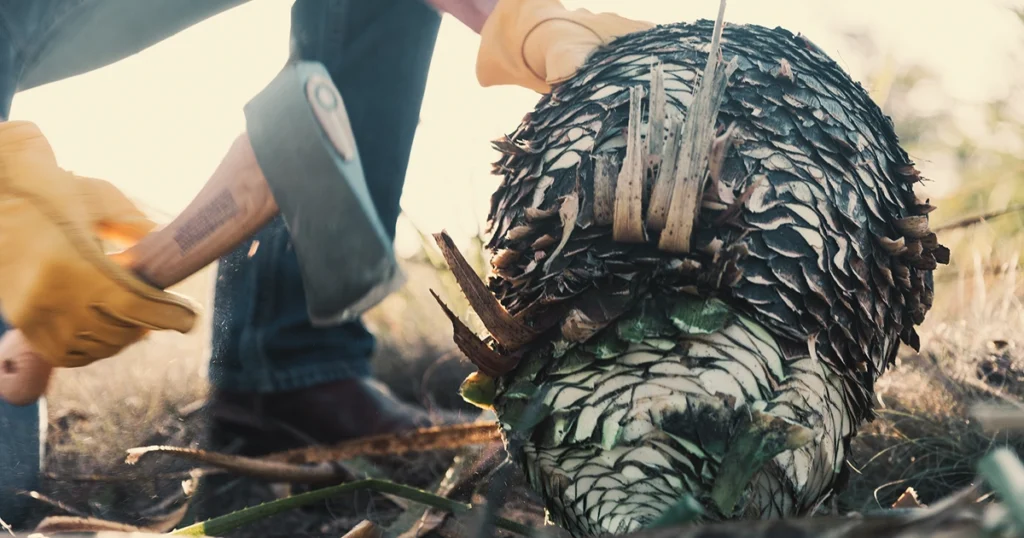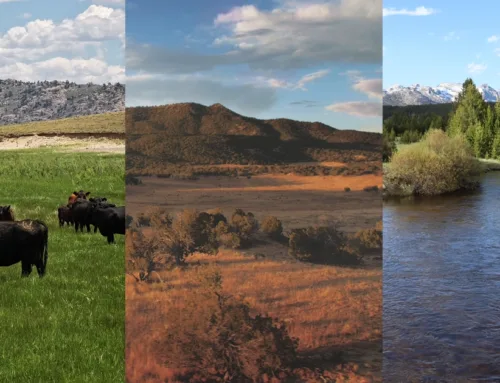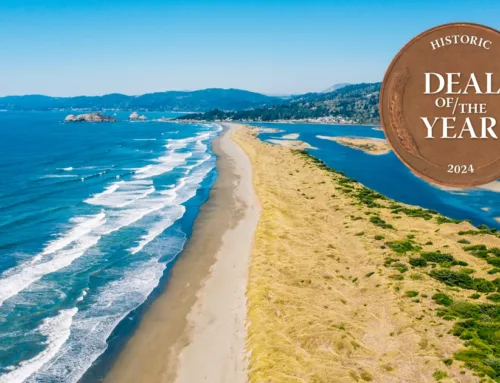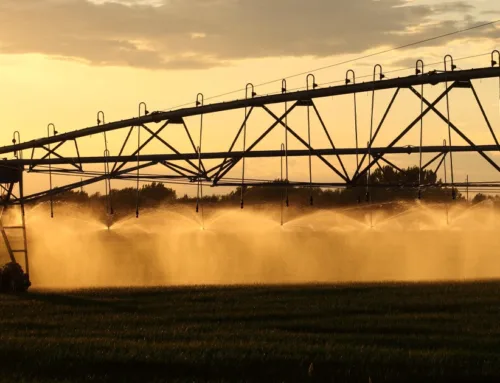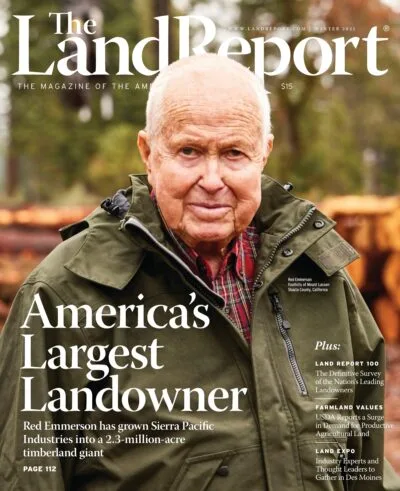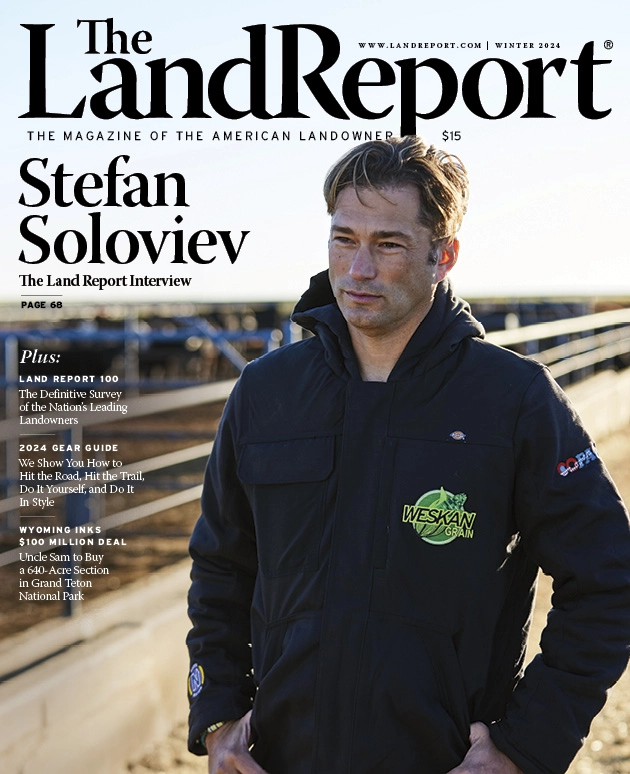The Wild Spirit of Texas
The Wild Spirit of Texas
By Drew Beard
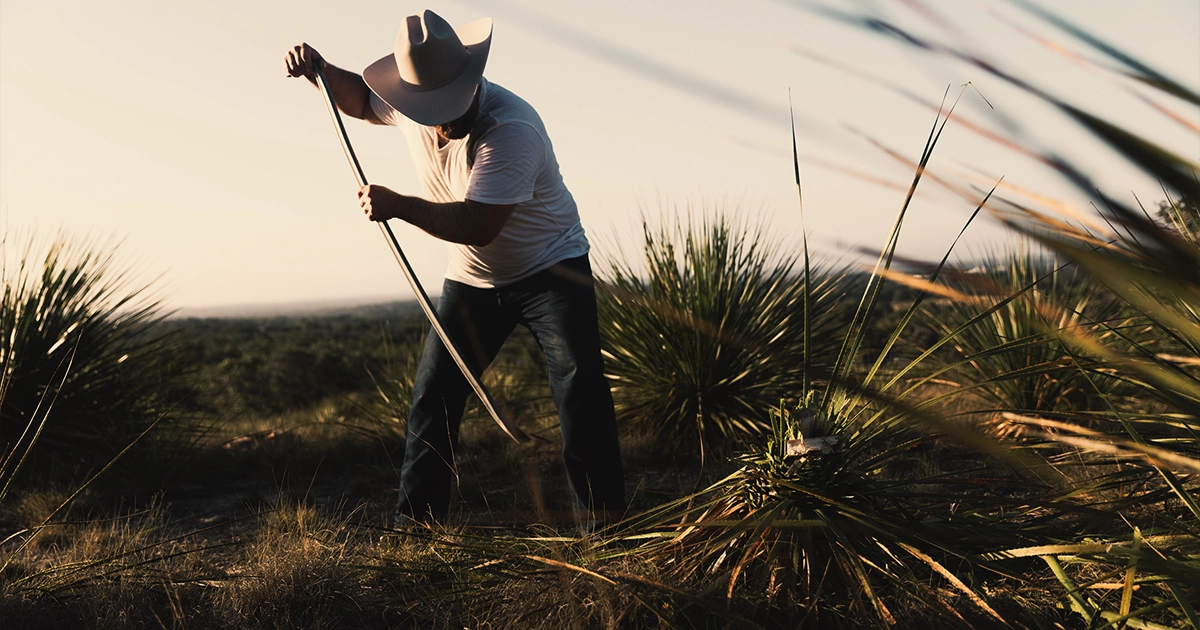
LR_TX_DesertDoor-01
DESERT DOOR DISTILLERY. America's first commercial producer of sotol started with a wild idea and a wild Texas plant.
Standing on stage next to representatives from corporate heavyweights such as Dell and Bank of America, Ryan Campbell felt out of place.
It was December 2021, and Desert Door, the small distillery he co-founded four years earlier, was being recognized as a Texan by Nature TX20 honoree. After surveying a field of more than 2,000 Texas-based businesses to identify just 20 winners, the nonprofit founded by former First Lady Laura Bush [see Land Report Texas 2021] was clearly impressed by Desert Door’s outsized contributions to conservation. Standing alongside his fellow awardees, Ryan was amazed at the journey Desert Door had taken in just a few short years. And it all started with a wild idea and a wild Texas plant.
B-School Project
Desert Door Distillery didn’t break ground with a conservation mission in mind. “In the beginning, we were just trying to figure out how to build a distillery, how to build a brand,” Ryan says. The idea for a craft distillery was the product of a class project at the McCombs School of Business at the University of Texas in the summer of 2016. “We got an A on it,” he tells me, still noticeably proud.
It was there that Ryan met Desert Door’s other founders, Judson Kauffman and Brent Looby. The three native Texans were former military. They shared a vague recollection from their younger, wilder days in West Texas of a spirit called sotol distilled from a desert plant. They agreed that the spirits market seemed saturated with gin, vodka, and whiskey, yet no one was making sotol. And while those other spirits were transplants from overseas, sotol’s roots ran deep in their native state.
Sotol, made from the desert spoon plant, is believed to be the first fermented beverage ever consumed in North America. It predates by centuries the ale, wine, and spirits favored by European colonizers. Thousands of years before they learned of its intoxicating properties, indigenous peoples used the desert spoon in many facets of their daily life. They made baskets from its leaves and weapons and construction supports from its stalks. They cooked and ate it for sustenance.
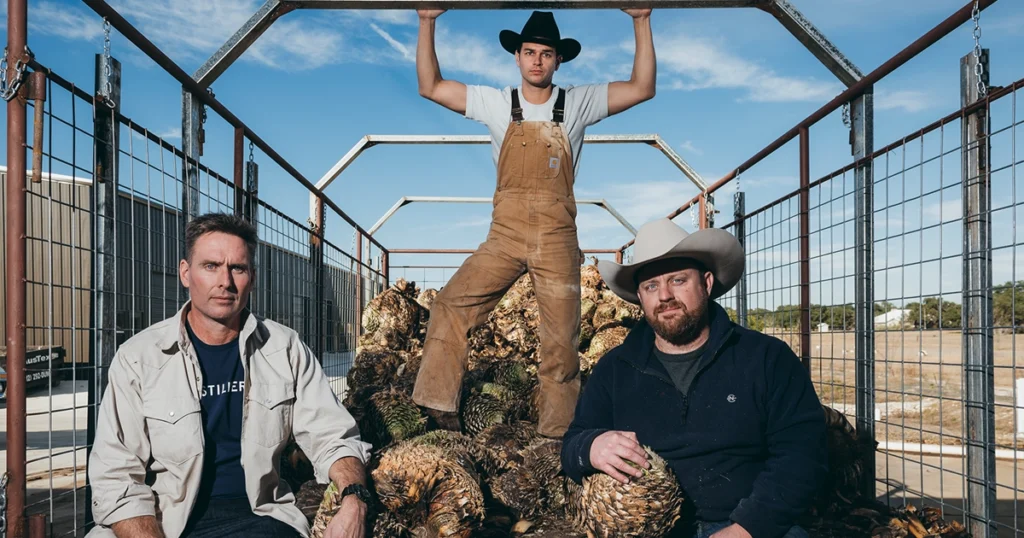
Desert Door founders (left to right) Brent Looby, Judson Kauffman, and Ryan Campbell got the idea to make Texas sotol while in business school at the University of Texas.
History of Sotol
Sotol’s long history can be seen and felt at the distillery’s 8,000-acre Desert Door Ranch in Terrell County outside of Dryden. Crude pits, probably used to ferment a primitive form of sotol, are scattered about, along with the remnants of stone ovens used for cooking the plant. “We have more than a dozen of these massive midden ovens,” Ryan tells me. “We can walk you through the history of sotol just on our ranch.”
Around 300 years ago, the Spanish introduced modern distilling techniques, giving birth to the sotol we know today. Prohibition brought an end to production, however. Despite attempts to revive the industry after the repeal of the 18th Amendment, sotol became a moonshine of sorts, the social lubricant for the kind of wild West Texas nights that would stick in the memory of Desert Door’s founders.
In the fall of 2017, Desert Door Distillery became the only commercial producer of sotol in the country when it fired up its stills in Driftwood, a short drive west of Austin. Ryan stresses the spirit’s unique connection to dasylirion texanum, a native Texas plant.
“I tell our visitors that what you’re drinking was a plant out there in the ground 14 days ago,” Ryan says. Those plants are wild harvested, then cooked under high pressure and steam. “Then we squeeze the heck out of it,” says Ryan, to extract the fermentable, molasses-like juices. Open top fermentation relies on an organic proprietary yeast before distillation in their custom-built hybrid still. The spirit, when diluted to 80 proof, becomes their Original Texas Sotol.
Water white and soft on the palate, it drinks like a premium blanco tequila with less of the vegetal notes of agave but more green grass and mint. A higher proof cut off the still is barreled in newly charred American oak for a full year before being bottled as their Oak-Aged Texas Sotol. Its amber hue is reminiscent of a young whiskey with the same vanilla and oak notes. The finish on both, as Desert Door likes to describe it, is “custard smooth.”
Sustainability
It wasn’t long after the distillery was built and their products fine-tuned that sustainability became a paramount concern for the Desert Door team. “How do you make a liquor from a plant that nobody wants?” Ryan quips. From the distillery’s earliest days there was never any intention to actively cultivate their raw material in order to keep their spirit as pure as possible.
“All of our plants are wild harvested. We don’t plant them, water them, or fertilize them. There are no insecticides, no pesticides, no fertilizers. It’s the cleanest, healthiest spirit that you can actually drink,” says Ryan. And while desert spoon is naturally abundant in West Texas, Desert Door knew from its earliest days that it would need to plan carefully to ensure a sustainable supply for future sotol production.
Desert Door sources desert spoon plants from roughly 50,000 acres of Texas rangeland that it leases or owns. They apply a stringent process for wild-harvesting across that massive area. “We only harvest areas of high concentration, and we only take 20 percent of the plants per acre at any given time,” Ryan says. Only the oldest plants get harvested. Afterwards, they don’t go near the same area for another 12 years, which is roughly the maturation cycle of the plant.
In working over the years to achieve what Ryan calls the “infinite production” of each ranch, the Desert Door team gradually became more and more connected to and aware of the land they were harvesting. They started looking for more avenues to support land conservation. “We all came together in the love of this plant and what it represents. It was a natural extension to want to give back.”
Wild Spirits Wild Places Foundation
In 2020, they found the perfect way to do just that. Experiments with prescribed burns on plant regeneration at the 7 Oaks Ranch had inspired them to produce a limited edition sotol, dubbed Back Burn, using spoon plants charred during the fires. Desert Door decided to contribute a portion of the proceeds from bottle sales to help fund future conservation efforts. A new extension for their product line, the Conservation Series, was created. But even that wasn’t enough for the Desert Door team. “We realized shortly after Back Burn that we needed a foundation,” says Ryan.
The Wild Spirits Wild Places Foundation launched at the end of 2020 with Karen Looby, cofounder Brent Looby’s wife, as CEO. Their stated mission is to conserve and preserve the diminishing ranches and rangelands of Texas through education and conservation. “Desert Door wants to leave the land better than we found it,” Karen tells me.
Projects like their controlled burn at 7 Oaks has led to requests from others in the community for support with conservation projects. “What we realized was that we have a unique perspective on conservation that wasn’t specifically the mission of another organization out there,” says Ryan. But they needed a more organized and efficient way to help their neighbors. “We wanted to make sure we had the right mechanism for that support,” says Karen.
Conservation Series
The foundation’s three focus areas are education, research, and conservation. On the conservation front, the distillery has continued to use its Conservation Series releases to support unique projects like a mountain cedar removal at Spoke Hollow Ranch in Wimberley in 2021. For 2022, an even more ambitious project aims to get broader support from nearby Austin and the surrounding areas to raise awareness about the importance of pollinators.
“We want to get the community involved. It’s more of a call to arms,” says Ryan.
In the research space, the distillery’s Desert Door Ranch has become a laboratory of sorts for environmental study. At present, Texas A&M has erected chemical sensors throughout the property to investigate the impact of pesticides and insecticides on migratory birds.
Education is where the foundation has some of its most unique and ambitious plans. “The goal of the educational series is to connect the community with all kinds of education experts,” Karen tells me. “We want the community to become passionate about being in the wild and really valuing it.”
To that end, Wild Spirits Wild Places is organizing a Conservation Summit this summer that will offer training in conservation practices like prescribed burns. Through the contributions of the foundation’s supporters, these workshops are being offered at minimal cost to make them accessible to as many as possible.
Virtual Reality
Not everyone, however, can experience wild places hands on, especially inner-city youths. So the foundation is working with Joe Llamas of Running Bull Media to bring the wild to them. “We want kids to be inspired to visit these places, so we’ve designed a virtual reality (VR) experience,” Karen tells me.
For their VR program, Karen and the Desert Door team worked with Selah, Bamberger Ranch Preserve, a leader in regenerative ranching. “Using virtual reality, kids will be able to experience their ranch and see things on their property like dinosaur tracks and the largest man-made bat cave in the world.” With any luck, such unique experiences will inspire a future generation of conservation leaders.
It would be impressive enough that three college friends managed to start a successful craft distillery and resurrect a unique spirit that was almost lost to time. But with the work of their Conservation Series and the Wild Spirit Wild Places Foundation, Desert Door has quickly become so much more than a craft distillery. And they’re only just getting started.
On stage at the TX20 Awards last year, Ryan felt no shortage of pride in his team. He also felt gratitude for where a wild desert plant had taken him. Had he and Brent and Judson decided to make vodka or whiskey, their journey would have surely been different. It may have never fostered the same passion for conservation. But setting their sights on sotol took them to the heart of West Texas, where that inspiration was undeniable.
“One of the coolest parts of my job are the places we get to visit,” Ryan says with sincerity. “We go to some of the most amazing properties. We’re lucky to own one ourselves. There’s something magical about them. When we take people to them for the first time, you can almost see their souls filling up.”
Originally published in The Land Report Texas 2022.


